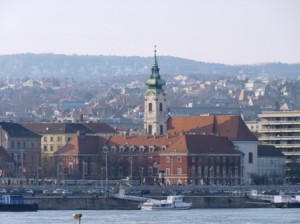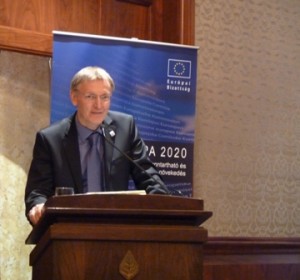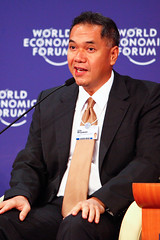Indonesian Investment Chief talks to GI on climate change
Gita Wirjawan heads up the Indonesia Investment Coordinating Board. He talked to GLOBAL IDEAS about the impact of climate change on his country and how Indonesia deals with the challenge.
On the banks of the blue Danube
 I took a good look at the river Danube in the centre of Budapest in my lunch-break today and in the sunshine on a pleasantly warm spring day, I could just about imagine it was blue like in the famous Strauss waltz. But like most major rivers these days, it is more brown than blue. And the sound all around is of traffic rather than music. The river is wide, flanked by beautiful historic buildings and host to a fleet of tourist boats.
I took a good look at the river Danube in the centre of Budapest in my lunch-break today and in the sunshine on a pleasantly warm spring day, I could just about imagine it was blue like in the famous Strauss waltz. But like most major rivers these days, it is more brown than blue. And the sound all around is of traffic rather than music. The river is wide, flanked by beautiful historic buildings and host to a fleet of tourist boats.
What an apt place for a conference on the “Future of European Waters”. It’s taking place within the framework of the Hungarian Presidency of the EU and I’m here with a group of journalists from different member countries on the invitation of the European Journalism Centre. Water is an “in” topic at the moment. At a high-level meeting here this weekend, the EU Environment Commissioner Janez Potocnik is presenting a “blueprint” for the future of water in the Community.
 Ultimately it’s all about how we treat water as a resource. The Commissioner and the scientists and experts speaking at the conference stress that water as a key resource can never be considered in isolation. We need it to drink, wash, grow crops, for industry, transport, to provide power and, as the disaster in Japan keeps reminding us, to cool nuclear reactors. So all different sectors have to be involved in making sure we have a secure water supply in the future, and that means quality as well as quantity. Demands on water, which is a scarce resource in many places, are rising all the time. And a river like the Danube flows through several different countries, so protecting it cannot just be a national issue. That’s when it becomes clear that Europe has an essential role to play.
Ultimately it’s all about how we treat water as a resource. The Commissioner and the scientists and experts speaking at the conference stress that water as a key resource can never be considered in isolation. We need it to drink, wash, grow crops, for industry, transport, to provide power and, as the disaster in Japan keeps reminding us, to cool nuclear reactors. So all different sectors have to be involved in making sure we have a secure water supply in the future, and that means quality as well as quantity. Demands on water, which is a scarce resource in many places, are rising all the time. And a river like the Danube flows through several different countries, so protecting it cannot just be a national issue. That’s when it becomes clear that Europe has an essential role to play.
Jacqueline McGlade is the Executive Director of the European Environment Agency. She told me here that water had to be the next big topic on the European Agenda, following on from energy and climate change. She mentioned the worrying increase in floods and droughts in Europe. All the climate experts tell us we have to prepare for more extreme weather events. Managing our water resources in a changing climate is becoming an existential issue. When it comes to what it means in practice, the buzzwords seem to be efficiency, technology and recycling. A country like Singapore has developed an effective and complex system to recycle and re-use its water.
The other key issue is coordination and involving all the necessary parties who have a need for or an impact on our water. It makes sense that protecting water is only possible by involving agriculture and industry both as users of water and sources of water pollution, and every sector that needs water. Europe’s water infrastructure – from drinking water to sewage processing – is getting old, a lot of needs to be replaced with more modern technology – but that’s a costly business. Plenty of things to talk about – and, we hope, act upon – for the politicians and experts here on the “blue Danube” this weekend.
Disaster and climate science – the story of Mt Pinatubo
This is a post-script to the blog entries from the Philippines by our reporter Carl Gierstorfer:
On my last day before returning to Berlin, I climbed Mount Pinatubo. Or rather what's left of Mount Pinatubo. Because in June 1991 a series of volcanic eruptions blew the top 160 meters off this mountain. A cloud of volcanic ash rose some 34 kilometers into the Earth's atmosphere (here is some more information and a picture from space, taken by the orbiting Shuttle crew). The evil twist in Pinatubo's eruption was that it coincided with a typhoon sweeping over Luzon Island. The heavy rains washed out much of the ash and deposited it over a wide area. Mudslides, called Lahars, destroyed villages and left 700 people dead. Large parts of this rice granary of the Philippines were covered in sediments up to one meter high. Probably worst hit were the indigenous Aeta people who used to live on the slopes of Mt Pinatubo. Although they managed to flee before the eruption, their habitat was destroyed; they were resettled in refugee camps, where many ended up as beggars and alcoholics.
The eruption had quite a dramatic effect on the world's climate. The following winter was unusually warm in the Northern hemisphere, while the Near East saw snow and corals died of cold shock in the Red Sea. For scientists these climate anomalies were a unique chance to calibrate their models against reality.
This is a short video I shot of the Pinatubo crater lake. What once must have been the most hostile spot on this planet is today a strangely tranquil and peaceful place. But don't be mistaken: Pinatubo is just sleeping as the bubbles of sulphuric gas and spots of hot water remind us. Enjoy.
Garbage Parade
Twice a year in Hoima, a town in the northwest of Uganda, they have a parade that goes through the streets and collects plastic garbage from the ground. The town is full of plastic bottles and other things. The problem is: it is totally dry. And when it is raining, the water just flows away and doesn´t reach the roots of the trees. This problem has been well known for years. But because of the extreme dry season the problem is getting bigger and bigger. The government tried to solve the problem. But now the bishop of the Kampala region found a way to make the people more responsible. The religious leaders in the country have a huge impact on the Ugandans. The bishop for example encourages couples to plant a tree before they get married. And guess what – it is working.
Will there be a democracy in Uganda?
This week there are national elections in Uganda. Many people I asked about the elections told me that democracy does not work in Uganda. "What we need is a new strong dictator", a woman told me. "The people just make the wrong decisions, they don´t know what is good for the country". I travelled to the countryside near the border to the Congo. Many people in Uganda live in small villages like the one you see in the video above. Many of them are disappointed – they don't have jobs. For the past two years there has also been an extreme drought. The crime rate is rising fast. The people that I asked in the villages hope for a law-and-order president. Many say that Som daid Idi Amin, the Ugandan dictator from the 1970s was not so bad. Having the freedom and democracy movements in northern Africa in mind I was kind of shocked and surprised. Are the people expecting demonstrations and riots during the election week? 'Yes', many said. Because they are quite sure that the results of the elections are going to be rigged. I'm wondering: What do they want? Free and democratic elections and a new dictator? What are they going to demonstrate for?









Feedback